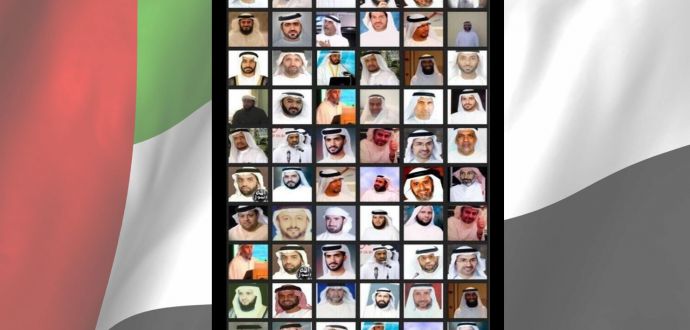This spring marks the five-year anniversary of the United Arab Emirates’ (UAE) prosecution of the “UAE 94” – 94 peaceful political activists who were charged in 2013 because of their dissident activities in 2011. The defendants came from all walks of life, and were on trial because they advocated for political reforms in the UAE. Authorities reacted by charging the defendants with founding an institution aimed at overthrowing the government, although the activists had only been seeking greater democratic freedoms. After a series of hearings and unfair trials marked by due process and human rights violations, the government sentenced 69 of the men to lengthy prison sentences with no right to appeal.
Emirati authorities began to prosecute the UAE 94 after the activists spread a petition in 2011 in which they demanded a series of democratic reforms. The group consisted of Emiratis from a variety of backgrounds, including prominent human rights lawyers, student leaders, academics, judges, and teachers. Their main aim was to promote democratic principles by peacefully exercising their rights of free speech and assembly.
The UAE authorities subjected many of the 94 activists to enforced disappearances, arbitrary detention, and torture, before trying the men in the Federal Supreme Court. At the conclusion of the trial, the court sentenced five defendants to seven years in prison, 56 of the defendants to ten years, and eight defendants (tried in absentia) to 15 years. The court acquitted 25 of the men. Trying the UAE 94 in the Federal Supreme Court under state security procedures ensured that the persecuted activists could not appeal the case to a higher court.
The court convicted the 69 activists despite credible allegations of due process and human rights violations, torture, and abuse. Government officials forcibly disappeared some of the defendants, holding them incommunicado in secret locations for extended periods of time before taking them to trial. As a result of their mistreatment, seventy-one defendants signed and submitted to the court a letter outlining 17 different types of torture they had endured while in detention, including beatings, being suspended upside down, petrol fume-induced asphyxiation, prolonged solitary confinement, inadequate heating, sleep, prayer, and toilet facilities, electric shocks, and denial of medical care. Despite this, the judge deliberately, repeatedly ignored their allegations of torture and refused to investigate their claims. Furthermore, in some cases, the state prosecutor’s arguments heavily depended on forced confessions extracted from the accused through the torture. Security forces committed these violations despite the UAE’s accession to the UN Convention against Torture and Other Cruel, Inhuman or Degrading Treatment or Punishment just the year before, in 2012.
The trial was biased against the activists in other ways. Although the UAE Attorney General released his accusations in late January, Emirati authorities neither released the identities, charges, or evidence against the defendants, nor did they allow the defendants access to legal assistance, until a month later. In addition, the defense did not receive the identity-, charge-, or evidence-related documents adequately in advance, nor did they receive a complete version of the documents. As a result, they could not mount a compelling defense.
Emirati authorities compounded these due process violations by arbitrarily barring family members, international observers, and international media from attending the hearings. “Preventing independent monitors and family members from entering the court only increases the suspicions as to why the authorities need to hide what is being said and done inside,” stated Human Rights Watch’s Middle East and North Africa director Sarah Leah Whitson. Authorities also persecuted family members of defendants who posted information about the hearings on social media. For example, after Abdullah al-Hadidi, the son of a defendant, tweeted that allegations of torture during the trial should be investigated, a court sentenced him to ten months in prison in 2013 under the Cybercrime Law.
As we mark the fifth anniversary of the trial of the UAE 94, it has become apparent that the Emirati authorities’ use of the judiciary to suppress calls for reform has not been reigned in. Instead, the UAE has used these same practices – enforced disappearances, incommunicado detention, and unfair trial practices – to sentence other activists to jail. The UAE must address these violations of international human rights standards immediately. It must begin by releasing the UAE 94 and by allowing greater freedom of expression and assembly. The UAE must also work to implement the reasonable democratic reforms the activists had called for in their original 2011 petition.
Giacomo Mattei is an Advocacy Intern at ADHRB





